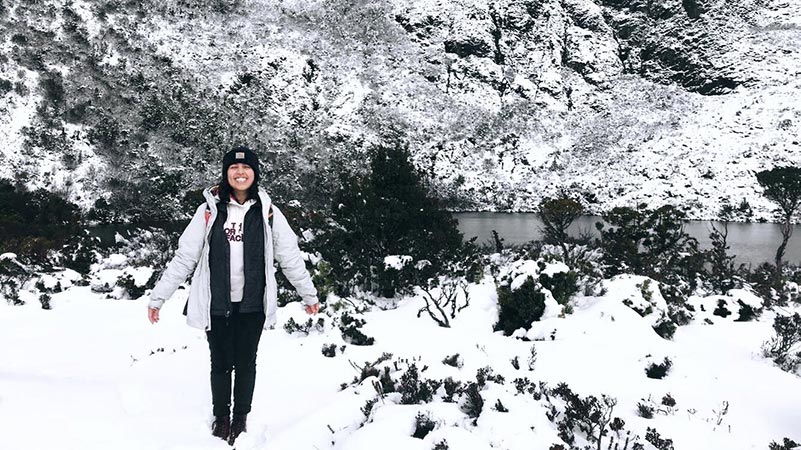
Denyz Melchor traveled across the world to Australia to learn more about primordial black holes. Monika Tadrous studied living cells in complex biological environments at a public university founded in Grenoble, France in 1339. Class of 2018 physics graduate Paris Pijuan investigated how to generate mechanical motion using light at a research laboratory at the foot of the French Alps.
These students spent the summer in another country as part of International Research Experiences for Undergraduates (REU), funded by the National Science Foundation. They worked under the guidance of faculty experts in diverse, leading-edge laboratories, and sharpened scientific skills, developed collaborations with scientists abroad, and experienced the life and culture of a foreign country.
Monika Tadrous
Tadrous studied at the Université Grenoble Alps, hosted by Louisiana State University’s International REU program. The mechanical engineering major is a MARC Scholar and works in the lab of CSUF’s Wylie Ahmed, assistant professor of physics. Last year, she was a scholar in the Louis Stokes Alliances for Minority Participation (LSAMP) program, which supported her research abroad.
What was your research focus?
I studied how living cells move collectively when they are in tissue-like groups, and how cells interact together, which is key in developing functional artificial organs in the future — one of my main areas of interest.
Why did this interest you?
I plan to study biomedical engineering in graduate school so this research experience abroad was a perfect opportunity since it combines biology, physics and engineering.
What did you accomplish?
I became more confident working in a diverse setting. Working with experts in the field also showed me that while getting a Ph.D. is hard work, it is what I want to do.
Paris Pijuan
Pijuan studied at the Institut Néel, a research laboratory in condensed matter physics also in Grenoble, hosted by Louisiana State University’s International REU program. He earned his bachelor’s degree in physics in May, and as a CSUF undergraduate, he also conducted research with Ahmed. He received accolades for his work , including the Dan Black Physics Scholarship, Rodriguez Graduate Admissions Scholarship and Physics Outstanding Scholarship Award. This fall, he began the doctorate program in electrical engineering at Princeton University. He is studying the physics of confined materials for photonic — an area of study that involves the use of radiant energy, such as light — devices.
What did you study in France?
I investigated how to modulate mechanical power using light. This project probed the boundary of classical and quantum physics, and can help develop ultra-compact sensitive microsensors and transducers.
What did you enjoy most?
I learned how to work in an environment that might not always be comfortable. You not only have to adjust to a new research environment, but a new culture as well.
What were some benefits?
The diversity in the experience taught me how to present my research to a broad audience. Clear communication was essential, which will help me with future collaborations and in writing grant proposals.
Denyz Melchor
Melchor studied at Monash University in Melbourne, Australia, hosted by the University of Florida’s International REU program. A physics major who aspires to earn a doctorate in the discipline, she is a researcher at CSUF’s Gravitational-Wave Physics and Astronomy Center under the mentorship of Geoffrey Lovelace, associate professor of physics. She is a McNair Scholar and a member of the National Society for Collegiate Scholars, CSUF chapter.
What was your research project?
I studied black holes that formed in regions of high density in the early universe rather than through star collapse. The project focused on extracting information about these black holes from detected and simulated gravitational waves.
What did you find fascinating?
At CSUF, I do research involving simulations of binary black holes and their lifespan as they orbit one another close enough for detectors to observe. In Australia, my goal was to find out more about black holes that are far away from detectors, and would translate as noise. This work gives us insight into how many black holes exist and the types of black holes that are within our universe.
Why study abroad?
The knowledge I brought back will help me in research projects I do at CSUF. I recommend every student go abroad to study or do research. It’s the most amazing experience.